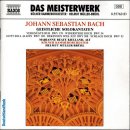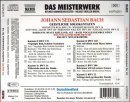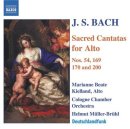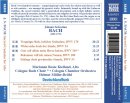|
|
Helmut Müller-Brühl & Kölner Kammerorchester w/ Marianne Beate Kielland
Sacred Cantatas for Alto
Cantatas BWV 53, BWV 54, BWV 169, BWV 170, BWV 200 |
|
C-4 |
J.S. Bach: Geistliche Solokantaten für Alt
J.S. Bach: Sacred Cantatas for Alto (BWV 53, 54, 169, 170, 200) |





|
|
1-5. Cantata Vergnugte Ruh, beliebt Seelenlust, BWV 170 [20:22]
6-8. Cantata Widerstehe doch der Sunde, BWV 54 [11:13]
9-15. Cantata Gott soll allein mein Herze haben, BWV 169 [22:23]
10. Cantata Bekennen will ich seinen Namen, BWV 200 [2:33]
11. Cantata Schlage doch gewunschte Stunde, BWV 53 [5:49] |
|
Helmut Müller-Brühl |
|
Bach Vokalensemble Köln [BWV 169] / Kölner Kammerorchester |
|
Mezzo-soprano: Marianne Beate Kielland
Soloists: Christian Hommel (Oboe d’amore [BWV 170]; Reneé Ohlidin (Violin) [BWV 200]; Sonja Wiedebusch (Violin) [BWV 200]; Gerhard Anders (Continuo Cello) [BWV 54, 169, 170]; Mercedes Ruis (Continuo Cello) [BWV 53, 200]; Harald Hoeren (Organ); Wiebke Weidanz (Organ) [BWV 170]; Thomas Welsch (Bells) [BWV 53]
KKO: Renée Ohldin (Concert-master); Irmgard Zavelberg, Dorethée Ragg, Sonja Riederbusch, Johannes Krause, Nicole-Mattea Stewart (Violin I); Alberth Rundel, Franz Neumann, Susanne Siller, Reiko Sudo, Christian Friedrich (Violin II); Theo Lenzen, Dana Bala-Ciolanescu, Victor Soumenkov (Violas); Gerhard Anders, Mercedes Ruiz, Teemu Myöhänen (Violoncellos); Thomas Falke (Double-bass); Christian Hommel, Jung Hyun Cho, Ann-Cathrin Collin, Peter Bodnar (Oboes); Martin Kevenhörster (Bassoon); Harald Hoeren, Wiebke Weidanz (Organs); Thomas Welsch (Bells)
Bach Vokalensemble Köln: Soprano: Banu Böke; Alto: Yvonne Berg; Tenor: Giovanni Arayuso (probably Giovanni Araujo Alves da Silva); Bass: Julian Schulzki |
|
Naxos 8.557621
= |
Oct 18-20, Nov 22-23, 2004 |
CD / TT: 62:40
MP3 / TT: 62:20 |
|
Recorded at Deutschlandfunk Sendesaal des Funkhauses, Köln, North Rhine-Westphalia, Germany.
Producer: Ludwig Rink; Engineers: Stephan Schmidt & Hans Martin Renz. A co-production with DeutschlandRadio.
See: Sacred Cantatas for Alto - conducted by Helmut Müller-Brühl w/ Marianne Beate Kielland
Listen on YouTube:
Cantata BWV 54 [12:03]: Mvt. 1: Aria [7:54] + Mvt. 2: Recitative [1:13] + Mvt. 3 [2:56]
Buy this album at:
CD (2005): Amazon.com | Amazon.co.uk | Amazon.de
Music Download: Amazon.com | Amazon.co.uk | Amazon.de | ClassicsOnline | iTunes |
|
An Exceptional New Disc of Bach Cantatas |
|
Donald Satz wrote (April 27, 2006):
Johann Sebastian Bach (1685-1750)
"Sacred Cantatas for Alto"
"Vergnugte Ruh, beliebte Seelenlust", BWV 170 [20:22]
"Widerstehe doch der Sunde", BWV 54 [11:23]
"Gott soll allein mein Herze haben", BWV 169 [22:23] *
"Bekennen will ich seinen Namen", BWV 200 [2:33]
"Schlage doch gewunschte Stunde", BWV 53 [5:49]
Marianne Beate Kielland, alto
Cologne Bach Choir *
Cologne Chamber Orchestra
Helmut Muller-Bruhl, conductor
Recorded by Deutschland Radio, Sendesaal des Funkhauses Koln,
Germany, October/November 2004
Naxos 8.557621 [62:40]
A wonderful recording in all respects! Although a modern instrument band, the Cologne Chamber Orchestra with Helmut Muller-Bruhl at the helm performs expertly in an historically informed manner. Actually, the only feature missing from what we would expect from a period instrument band is the pungency of baroque stringed instruments. Crisp attacks, minimal vibrato, buoyant rhythms, glowing warmth and beauty of form and tone inform these performances at every turn and very much remind me of the interpretations of Masaaki Suzuki in his exceptional on-going cycle of the Bach Cantatas.
Of course, the quality of the solo alto is crucial in these Bach sacred works, and I am happy to report that Marianne Beate Kielland passes the test with flying colors. She has a dark-hued, husky, and tonally attractive voice that is highly expressive, determined, and decorated in sensuality. Best of all, Kielland excels in conveying the rhetorical nature of the recitatives. Her voice does not have the tonal purity of alto Yoshikazu Mera for the Suzuki cycle, but her range and depth of expression are much greater than Mera's. Kielland is a young Norwegian vocalist who has risen quickly in reputation since graduating in the spring of 2000 from the Norwegian State Academy of Music. She now tours Europe regularly with leading orchestras and chamber groups, while her recorded discography includes Bach's St. Matthew Passion (BWV 244) and his Mass in B minor (BWV 232) in addition to this disc of Cantatas for solo alto. Kielland should have a fantastic career ahead, and I am eager to hear more from her.
Here are further comments about the program and performances:
BWV 170 - Bach composed this cantata for the Sixth Sunday after Trinity, 1726. The text, written by Georg Christian Lehms, contrasts the contentment of Heaven with the miserable nature of life on Earth. Although a mature work, this was the first cantata where Bach used the organ as an obliggato instrument having an independent role.
The opening aria is a spiritually uplifting piece in D major replete with gentle rocking from the lower voices that gracefully supports the beautiful legato melody from the first violins and oboe d'amore. The Cologne performaconveys a fine comfort/security and complete emotional satisfaction that are enhanced by Kielland's confident singing. The mood then becomes nasty in the recitative where Kielland gives us a laundry list of the vile aspects of the human condition. I love her lecturing tone; Kielland's voice has a personality that knows what it wants, works hard to achieve goals, and expects others to do the same.
The middle aria is in F sharp minor, considered the Baroque key of distress. Here, the 2-manual organ takes two primary melodic lines, greatly enhancing the haunting and disorienting nature of the music. Organist Wiebke Weidanz performs splendidly, and Kielland makes me shiver when she sings "I tremble, yea, and feel a thousand torments". The following recitative accompagnato restores an environment of optimism, introducing the final aria in D major that affirms the victorious journey to heaven.
From this first work on the disc, it is clear that Muller-Bruhl and company have the measure of Bach's sound world and emotional content. Also clear is that Marianne Beate Kielland is among the best of the current crop of altos in portraying the range and depth of emotion found in Bach's Cantatas. That she does so with delectable tonal properties is a lovely bonus.
BWV 54 - Whereas BWV 170 contrasts heaven and life on earth, BWV 54 pits steadfast faith against the Devil. Having only two arias framing a recitative, it is one of the shortest cantatas Bach composed. However, it is also one of his richest and most compelling works, the great warmth of the first aria complemented by the severity and thrust of the 4-part fugue of the second aria. Kielland continues to impress as she switches with complete conviction from comforting refrains to austere declarations. Also, Muller-Bruhl is an excellent director, imparting a spiritual glow to the first aria and a rock-steady determination to the second.
BWV 169 - Generously scored for three oboes, strings, obliggato organ and bass continuo, this extended cantata has two arias, two recitatives, an arioso, opening sinfonia and concluding chorale. Unlike the previous two cantatas, BWV 169 does not thrive on contrasting themes. Instead, Bach offers us joyous music-making where security and love are the dominant themes. The opening sinfonia, also used in Bach's Harpsichord Concerto in E major, is an excellent example of Bach's portrayal of the exhilaration of life and faith, and Muller-Bruhl's buoyant interpretation leaps out of the speakers. In the chorale, the only one on the disc, Bach's arms are stretched outward to envelop, protect, and enlighten all who enter his sound world.
BWV 200 - This Aria is all that remains of a lost Bach Cantata that was composed about 1740 for the Feast of the Purification. The text is a tribute to the Lord and ends with "the Lord is the light of my life". For comparison, I listened to the Gardiner version on Archiv Produktion, and Muller-Bruhl easily takes top honors. Although the text well accommodates an exuberant musical approach, Gardiner's four-minute reading sounds drab and lifeless compared to Muller-Bruhl's vibrant account where the conversation of the two violins is captivating.
BWV 53 - This programmed aria is just one movement of a larger mourning cantata. The music is gorgeous and quite elegant, and Muller-Bruhl invests it with a comfortable pacing that "fits like a glove". Those not familiar with this aria will likely be surprised at Bach's use of bells, a device he rarely employed in his compositions.
Don's Conclusions: This excellent Bach Cantatas disc for solo alto is fully the equal of my favorite period instrument recordings by Suzuki, Gardiner, Herreweghe, Koopman, Leonhardt and Rifkin. With sonics that
are crisp and appropriately rich, I strongly recommend acquisition to both period instrument and modern orchestra enthusiasts. The sole drawback is the lack of texts, but these can be downloaded from the internet and should not factor strongly in one's decision to purchase such a splendid set of performances at super-budget price. |
|
Yoël L. Arbeitman wrote (April 28, 2006):
Donald Satz wrote:
< BWV 53 - This programmed aria is just one movement of a larger mourning cantata. The music is gorgeous and quite elegant, and Muller-Bruhl invests it with a comfortable pacing that "fits like a glove". Those not familiar with this aria will likely be surprised at Bach's use of bells, a device he rarely employed in his compositions. >
As a lover of this music who has collected "Schlage doch" in particular for many decades beginning in the late 1960s when a wonderful and eccentric NYC DJ played the Roessl-Majdan/Scherchen recording five times consecutively on the radio, I am appreciate to Don for calling this recording to my attention.
I have a Yahoo group devoted to this cantata by Georg Melchior Hoffman to whom currently it is generally ascribed: http://launch.groups.yahoo.com/group/GMHof/
I believe that I have uploaded there 12 recordings of this cantata with bells. There are at least two more which I only have on LPs which is beyond my limited technical abilities to digitize. The uploaded recordings are about equally divided between female altos/ mezzos and counter-tenors.
I generally abhor textless CDs but as this is Naxos and cheap, I guess we can forgive the situation. |
|
Yoël L. Arbeitman wrote (April 29, 2006):
And here is Scott Morrison's review: Amazon.com |
| |
|
Helmut Müller-Bruhl : Short Biography | Ensembles: Kölner Kammerorchester
Bach Discography: Recordings of Vocal Works | Sacred Cantatas for Alto - Müller-Brühl w/ M.B. Kielland |
|
|